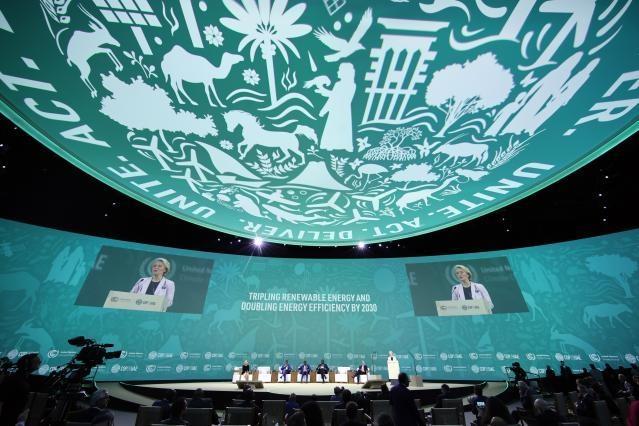
At the end of the COP28 UN Climate Conference in Dubai, European Union negotiators succeeded, with partners from around the world, to keep alive the possibility of delivering on the commitment in the Paris Agreement to limit global average temperature increase to 1.5 Celsius above pre-industrial levels. With a particular focus on the energy sector in the talks, parties agreed to accelerate the transition away from fossil fuels this decade, to take action to reduce emissions by 43% by 2030, and set the world on a pathway to reaching net zero emissions by 2050, in line with the best available science.
COP28 concludes the first Global Stocktake under the Paris Agreement. The goals of the Global Renewables and Energy Efficiency Pledge, championed by the Commission, have been translated into the Global Stocktake outcome. All Parties have committed to triple global renewable energy capacity and double the rate of energy efficiency improvements by 2030. This gives powerful momentum to the transition away from fossil fuels. There is also an agreement to tackle methane emissions and other non-CO2 emissions in this decade, and to phase out as soon as possible inefficient fossil fuel subsidies that do not address energy poverty or the just transition.
The Global Stocktake recognises that the world is not currently on track to reduce emissions by the necessary level to limit temperature increase to 1.5 Celsius. As a consequence, Parties agreed on a pathway to get back on track, including through a process to align national targets and measures with the Paris Agreement. Parties should submit their nationally determined contributions (NDCs) for 2035 by COP30, in two years' time, and these should be aligned with the best available science and the outcomes of the Global Stocktake.
The Global Stocktake also addresses the means of implementing the necessary transition. We have agreed on the final steps towards setting the new collective quantified goal on climate finance at next year's conference. The framework of the Global Goal on Adaptation is a major step, and it is accompanied by ground-breaking decisions on adaptation finance with recognition that adaptation finance will have to be significantly scaled up beyond the mandated doubling for 2025. The outcome pushes forward the reform of the international financial architecture, making it fit for purpose for addressing the climate emergency. Specifically, the EU made a significant contribution to agreeing and operationalising a new fund responding to loss and damage, and the EU and its Member States have contributed more than €400 million, over two thirds of the initial funding pledges.
Further information
Full European Commission press release
Statement of President von der Leyen on the outcome of COP28
Opening remarks by Commissioner Hoekstra at the final Plenary of COP28
Details
- Publication date
- 13 December 2023
- Author
- Representation in Ireland
